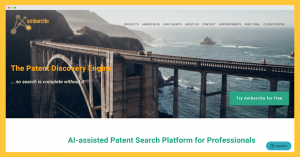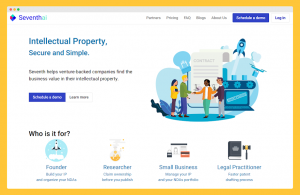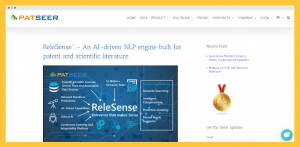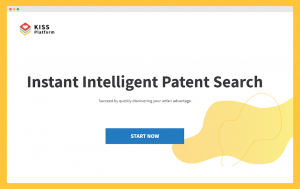Did you know all published patents and their information is publicly available?
These are thousands and thousands of patents that can show you the technology behind inventions.
And that’s not all. You can also discover who owns them, analyze your competitive landscape, and discover tech trends — if you have the right tools.
This is precisely what patent intelligence is. Transforming patent data into useful information to make smarter decisions.
Unfortunately, though, it’s mostly big companies that use patent intelligence to their advantage.
But what about smaller companies? How can they use patent intelligence to develop better strategies? To have a fighting chance against the big guys?
There are many patent intelligence tools you can use for that.
Here’s a list of the best ones.
Patsnap
Patsnap is one of the most popular patent intelligence tools out there.

This AI-powered tool offers a search that will help you understand your market, your competitors, and even partnership opportunities. The data available includes patents, scientific journals, and litigation.
With Patsnap you can conduct a semantic patent search, which allows you to find better results.
You can also get alerts on patents or companies that you’re interested in and do very specific searches. This is great if you know what you’re looking for (which isn’t always the case).
Unfortunately, although they claim they’re designed for businesses of all sizes, it’s clearly focused on BIG industries like automotive, aerospace and defense, and agriculture.
Patsnap has a lot of information available which can easily become overwhelming and it tends to be a bit outdated. Another downside is that if you’re using it as a team, it can be very expensive, as they charge per user and not per company.
Ambercite
This tool is solely focused on patents.

Ambercite is an AI-assisted patent search platform. It might not be a flashy tool but it does a great job at finding patents that other tools often miss.
Ambercite’s database is very complete, with millions of patents from different jurisdictions around the world, plus citations. Ambercite uses this network to give you a list of scored and ranked patents.
If you want to really take advantage of Ambercite, you need to do a previous patent search. This is because Ambercite finds patents based on an initial patent. The results are great but if you don’t know that initial patent number, you won’t get much out of it.
Seventh.ai
Seventh.ai is focused on startups and smaller companies.

Seventh.ai started as a research project at UC Berkeley’s Fung Institute. They later evolved into a platform to help inventors protect their innovations.
Since that’s their end goal, their search tool is not the best one out there. The tool’s main objective is to determine if your idea is patentable. If it is, then you can use their patent wizard to file for a provisional patent right away.
Seventh.ai will fall short if your focus is to conduct a thorough patent search and find relevant information you can make important decisions with.
But, if you want to use a tool to manage your intellectual property, then Seventh.ai might be helpful then.
Google Patents
Yes, you can also search for patents in Google, using their Google Patent Search.

This search tool works very similarly to the normal Google but with patents. You type in some keywords and Google gives you results.
Since this tool is free and fast, you can experiment with lots of keywords and get different results. Searching for the right keywords will give you more relevant results.
Google has serious limitations, though. The number of fields that can be searched is very limited and there are serious holes in the database. We’ve personally searched for patents that we know exist and we haven’t always found what we were looking for. We’ve talked to other patent agents and attorneys and many have had this problem too.
IP Rally
A Finnish tool that offers straightforward results.

IPRally uses AI and graphs to make better patent searches.
The idea behind IPRally is to create a search tool that “thinks” like a patent professional. The tool has a semantic and technical understanding and the interface is very intuitive. IPRally is fast and you even get relevant parts of patents highlighted so you can know better what to read in each one.
The Finnish Patent and Registration Office recently started using IPRally to examine the patentability of inventions.
However, to better use this tool you need to understand how their “graph” system works. These graphs are similar to “claim charts” or “feature charts.” If you’re not familiar with them, you’ll have to invest quite a lot of time to learn.
IPRally also gives you the chance to search for a patent using text but it has to be structured as a claim-type or at least patent-type to get better results.
ReleSense
ReleSense is PatSeer’s engine built specifically for patent and scientific literature.

ReleSense supports PatSeer in the search of patents but also in categorization and predictive analytics. ReleSense relies on AI and NLP to provide relevant results for the end user. An advantage of it is that it’s always improving, using new patent filings and additional sources.
Since PatSeer is completely patent-focused — you’ll need to dig deeper into the information if you’re interested in other topics like competitors or learning more about your market landscape.
This tool is more for patent professionals so it’ll be overwhelming for inexperienced users. Some features are very specific and you’ll need time to learn how they work and if they’re useful for your business.
LexisNexis PatentSight
PatentSight is focused on the competitor-side of the patents.

Analyzing patent information is a great way to know what your competitors are up to and if there are some tech trends you should look out for. PatentSight helps you improve your R&D strategies by identifying competitors.
The main advantage is that they have clear and accurate patent data. They combine an automated algorithm and a data team that collects, enhances, and cleans the data.
For example, they make sure that the system knows current accurate corporate structures, map historical corporate name changes, implement mergers and acquisitions, and correct misspellings and translation mistakes.
This tool is aimed more at intellectual property professionals so smaller companies or independent entrepreneurs are not likely to find it super useful.
KISSPlatform
With more than 20 years of supporting innovators to protect their ideas, KISSPlatform was built with their needs in mind.

KISSPlatform is much more than simply a competitive patent intelligence toolkit. We use AI and NLP (Natural Language Processing) to conduct a semantic patent search. The difference with other semantic patent searches is that with KISSPlatform, you can use natural language to describe your idea.
The AI was trained to understand how common people describe their business ideas, not on how those ideas are described in patents. This is a big advantage if you’re not experienced in how patents are written.
The AI searches through millions of US patents and a curated database of over 18,000 companies and identifies the ones that are relevant to the description of your business idea. Then, it gives you a quick snapshot of how your invention stands against others. You even receive a “uniqueness” and an overlap score for your idea.
With this information, you also get clarity of what your competitive landscape is like, so you can rapidly iterate, adjust, and launch your idea.
Many tools are useful only if you know exactly what you need to ask and where to look. But that isn’t always the case. KISSPlatform helps you even if you don’t know what questions to ask, where to look, or how to search like a pro.
What’s the best patent intelligence tool for you?
All of the tools we mentioned are great but, as you could see, they have different purposes and are aimed at different users.
The best thing you can do to choose the perfect patent intelligence tool is to inform yourself and really think through what you want to get out of it.
Think about what stage your idea is in, your budget, your resources, and even how much time you have to invest in conducting an intelligent patent search.
Patent intelligence is not only for the big companies that have complex R&D departments, it’s for every individual that’s innovating!


